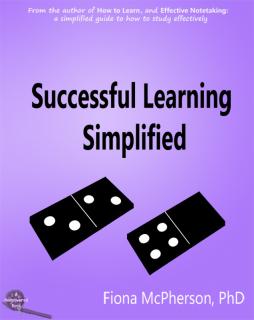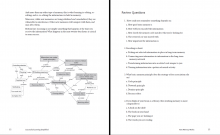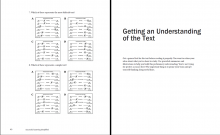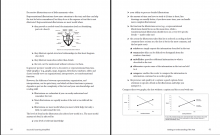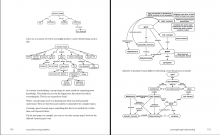Being smart helps. Working hard helps more. But working effectively helps most of all.
There's a great deal that research can now tell us about how to study effectively. For 20 years, I've been reporting on research into memory and learning, and explaining how these findings can be translated into practical advice. In earlier books, I have presented a lot of detail on strategies in specific areas: note-taking, mnemonics, practice and revision. In this guide, I attempt to provide an overview of how to approach your learning, and the strategies you should consider using.
The book covers:
- preparing for learning
- approaching a text
- reading
- taking notes
- building understanding
- navigating non-linear environments
- dealing with lectures
- memorizing
- revising
- building expertise in skills
- how specific subjects differ in their needs & demands.
The book can be used as an adjunct and quick reference for those who have the more in-depth workbooks, or as a simplified guide for those who want the bottom-line without the detail.
This is not a book for students who want a magic bullet, who want a five-minute 'answer' to effortless study! But students who want to know that their time and effort are being used wisely, that their diligence will be rewarded with better marks and more long-lasting learning, this guide may be the answer they've long been looking for.
Publication date: December, 2014
File size: 6.8 MB / 224 pages
ISBN:
978-1-927166-20-8 (pdf)
978-1-927166-22-2 (epub)
978-1-927166-21-5 (mobi)
About this book
Introduction
How memory works
The nature of long-term memory
The importance of working memory
A lot of editing goes on!
Approaching your learning
Priming
Goal setting
Evaluating the text
Getting an understanding of the text
Summaries
Skimming
Main points
Reading
Levels of processing
Active reading
Reading expository texts
Active reading strategies
Main points
Taking notes
Notetaking makes information meaningful
Highlighting
Creating summaries
Main points
Learning through understanding
Understanding is rooted in the connections you make
Asking questions
Making comparisons
Concept maps
What this means for notetaking
Reading non-linear material (on the web or in computer modules)
Navigating a hypermedia environment
Problems & benefits of animations
How to learn effectively in hypermedia environments
Getting the most out of lectures
How lecture notes are different from textbook notes
Are there special strategies for taking notes in lectures?
Different approaches to lecture notetaking
Memorizing verbatim
Mnemonics
Rhythm & rhyme
Keyword method
First-letter mnemonics
Simple list mnemonics
More complex list mnemonics
Main points
Revising
Types of retrieval practice
How often do you need to practice?
Spacing your practice
The ten principles of effective practice
Skills
Critical factors in mastering skills
The ten principles of effective skill practice
Specific Subjects
Reading
Note-taking
Writing
Understanding
Remembering

